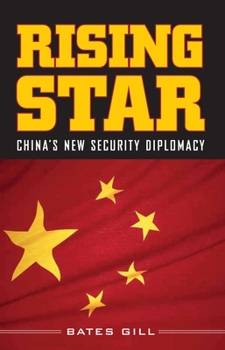Rising Star: China's New Security Diplomacy
Select Format
Select Condition 
Book Overview
" China's diplomatic strategy has changed dramatically since the mid-1990s, creating both challenges and opportunities for the United States. U.S. policymakers have only just begun to comprehend these critical changes, however, and all too often their China policy has been incoherent. In Rising Star, Bates Gill points the way out of this morass. Based on a comprehensive and far-reaching analysis of the transformation in China's security diplomacy,...
Format:Hardcover
Language:English
ISBN:0815731469
ISBN13:9780815731467
Release Date:March 2007
Publisher:Brookings Institution Press
Length:267 Pages
Weight:1.25 lbs.
Dimensions:1.0" x 6.4" x 9.2"
Customer Reviews
2 ratings
Scholarly analysis of Chinese diplomacy
Published by Thriftbooks.com User , 14 years ago
Former U.S. Secretary of State Henry Kissinger once described diplomacy as "the art of restraining power." As China unleashes its economic power, and its political and military strengths continue to mount, what role will diplomacy play in China's fate in the 21st century? In great depth and detail, author Bates Gill, an expert on China's foreign policy, explains a dramatic change in the way China views the world, and in its approach to national security and international relations. This shift has taken China far from the Maoist age of supporting terrorism and counterrevolution, and into a new era that emphasizes collaboration and cooperation, participation in international initiatives, and some compromise on such issues as sovereignty. Gill scrutinizes each cog in China's diplomatic machine (except the U.S.'s debt, which has grown in signficance over time) and provides a thorough historical background. Though this book is remarkably well-researched and revealing, its style is more suitable to academia than to general interest reading. Yet, getAbstract reckons that international relations enthusiasts with an interest in China's role in the world can learn a lot from it.
China's Twin Rises
Published by Thriftbooks.com User , 16 years ago
Director of the Stockholm International Peace Research Institute and Freeman Chair in China Studies at the Center for Strategic and International Studies in Washington, Bates Gill offers in Rising Star a refreshing and certainly less alarming assessment of the spectacular "rise" of China than the one painted by the security intelligentsia in recent years. In other words, his position on the "rise" of China is that it is, or can be, more peaceful. Gill's principal argument, that a clash at some point in future involving the US and China is not inevitable, rests on three pillars that he argues are guiding Beijing as it expands its power: alleviating external tensions so that it can focus on domestic problems; reassuring neighbors about its peaceful intentions; and finding ways to quietly balance the US. Gill contends that the key to a successful rise - one that avoids war - lies in the US and its allies understanding and judiciously responding to China's new security diplomacy. While China's "rise" has been long in the making, Gill argues that the strategic reorientation of the US following the Sept. 11, 2001, terrorist attacks has created an opportunity for China to flex its muscles diplomatically. On issues that are linked to the "war" on terror, the US has been receptive to - and has in fact encouraged - a bigger role for China. Nonproliferation is one area where Gill sees China as having made progress, mostly through its participation in or dialogue with nonproliferation regimes such as the Nuclear Nonproliferation Treaty, the Missile Technology Control Regime, the Comprehensive Test Ban Treaty, the Australia Group and the Wassenaar Arrangement. He points out, however, that at present the Chinese government is unable to adequately deal with proliferation in the private sector, an onerous task under normal circumstances and a gargantuan one given China's incomplete laws, the size of its territory, rampant corruption and longstanding trade and military alliances with states like Pakistan and Iran. Another dynamic that is shaping China's security diplomacy is its opposition to US hegemony, which has compelled Beijing to shed its historical aversion to alliances and treaties. In its immediate area, China has spearheaded the creation of a number of regional organizations, including the ASEAN Regional Forum (ARF), the Shanghai Five and the Shanghai Cooperation Organization (SCO). It was no coincidence that the latter was launched to coincide with NATO expansion in the mid-1990s. Beyond regional trade agreements, conflict resolution mechanisms, counterterrorism and joint military exercises, the Shanghai Five, ARF and SCO have provided China with a greater say in Central and Southeast Asia and the acknowledgement by participants that "every state has the right to choose its own political system, economic model and path of social development," with special focus on territorial integrity. What these security arrangements have in common, furthermore,






